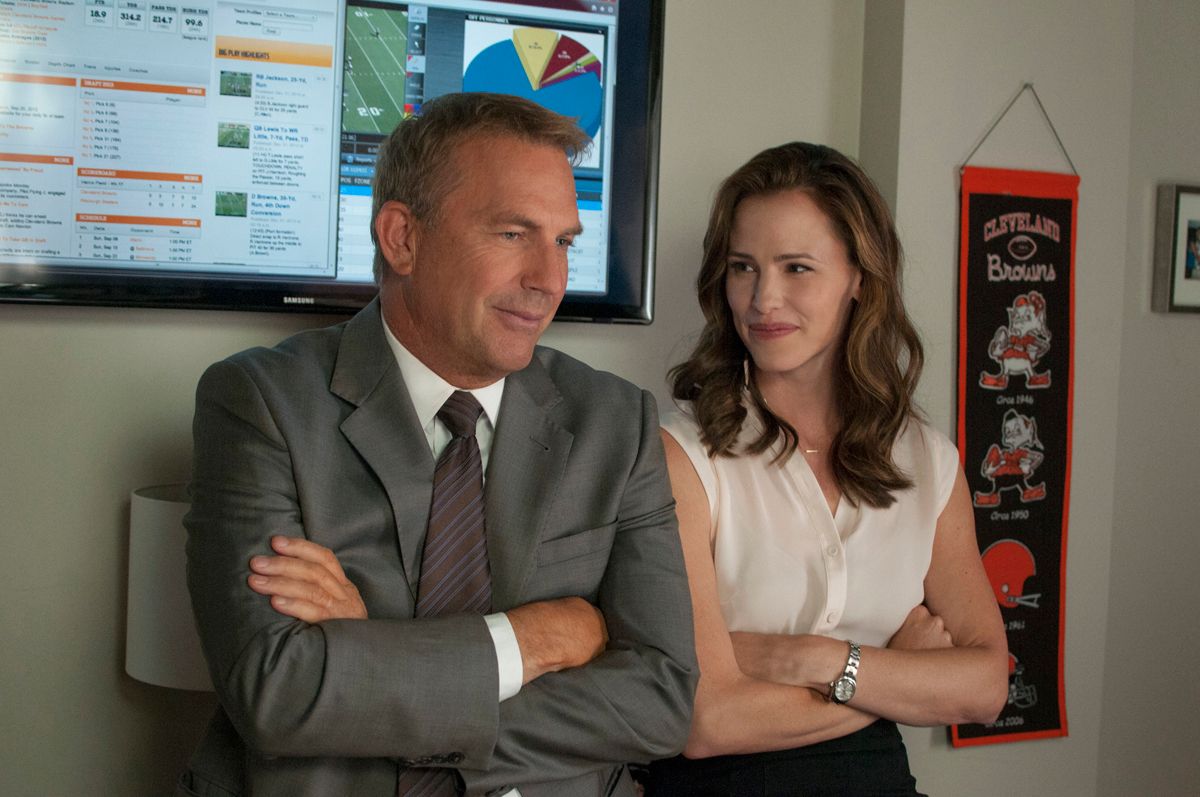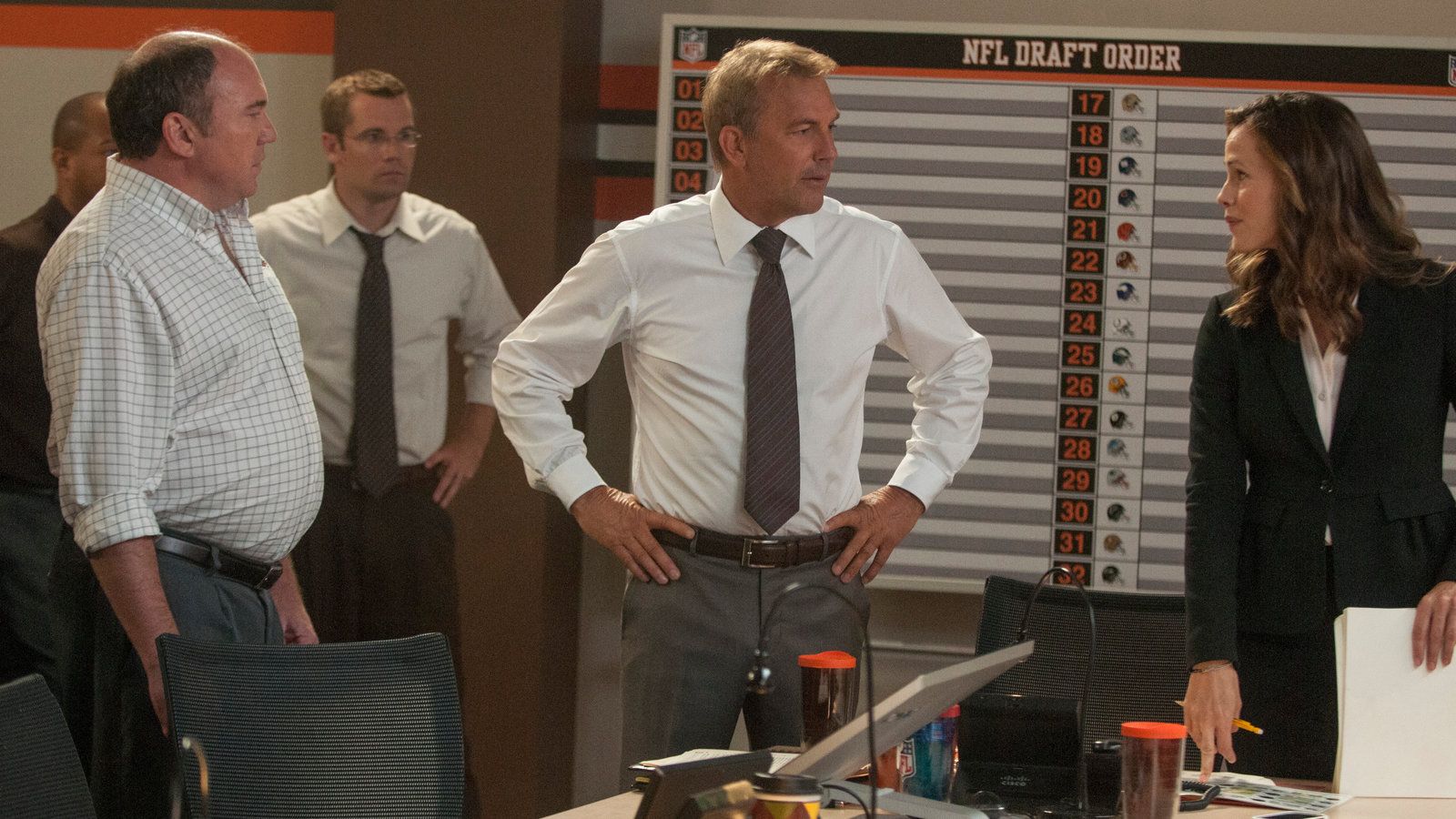I don’t know how watching Draft Day became an annual tradition for me. I was lukewarm on the film when I first saw in 2014, but I decided to re-watch it on a plane ride a few years back and I was far more taken with Ivan Reitman's energetic direction and Kevin Costner's sour-but-credible performance as Browns general manager Sonny Weaver Jr. But what really jumps out at you is how much Draft Day feels like an NFL product that begs you to get swept up in the romanticism of the NFL. The NFL is a business, but they work overtime to make you forget that about billions of dollars and highly paid athletes sacrificing their bodies as a bunch of dudes in polo shirts try to work their way to the Super Bowl, which means more money for that team. Winning is inherently fun, but it's also very profitable. So how do you make a movie about the cold, hard business of football while keeping it imbued with the romanticism the NFL demands? The answer is Draft Day.
For those who need a brief refresher, the Browns start out with the #7 overall pick and are planning to get either defensive player Vontae Mack (Chadwick Boseman) or possibly running back Ray Jennings (Arian Foster). However, the team's owner, Anthony Molina (Frank Langella), wants Sonny to make a splash, and Sonny has been offered the #1 overall pick by the Seattle Seahawks. To get the pick, Sonny had to trade away his next three years of first round picks (for those who don't follow football, the first rounder is the closest thing you have to a "sure thing"; they're players who are ready to start on day one, their rookie contracts are cheaper, and they're the future of your franchise), but in exchange he can get quarterback Bo Callahan (Josh Pence). Sonny spends the lead-up to the draft wondering if Bo is the guy for the Browns or if he should go after Mack and/or Jennings.
Everything in Draft Day is about emotion and character, and while that's typical for a sports film about players, it's unusual when the story is about management and business people. The front office guys do not usually get to play the heroes because they deal in finance and numbers, and yet Draft Day is largely unconcerned with those aspects of the business. There's no discussion about tangibles for Bo Callahan—how far he throws, his QB Rating, how he performs under pressure—and it's all about intangibles. The film argues they already know about how Bo plays, so what they need to know is the stuff about his personality. It's not about his play; it's about his character. The fact that part of the plot turns on whether or not Bo's college teammates came to his 21st birthday party is so freaking ridiculous, but that's the ethos of Draft Day—your character is what determines your efficacy.
Obviously, this is not how football really works, or at least, teams tend to have no problems overlooking serious character flaws if it means there's a way to win. But Draft Day, as a NFL product, wants you to believe that it's about hiring men of character who will do right by "The Shield" (the nickname for the logo if you need more evidence of how seriously the NFL takes its own image). The league is about emotions and people and good, honest people. Draft Day isn't designed to sell you a product (if you care about this movie, chances are you're already a regular NFL viewer); it's designed to reinforced your identity and belief that caring about the NFL is worthwhile.
The actual game of football and the real decisions that factor into how players get drafted or even the actual value of the draft live in the periphery of Draft Day. Sure, there's a scene where they watch some game tape and the occasional discussion of players who were either busts or sleepers, which is fair. The Draft is not an exact science; if it were, every player would work out and be accurately drafted at their respective position. But a movie about average draft position and player value relative to that position is a dry, cold, and heartless film that acknowledges that football is business, and the NFL wants you to believe that, to use their own slogan when selling merchandise, "Football Is Family."
That family ethos is what pervades all of Draft Day. You've got Sonny dealing with the baggage of his father's death (Sonny not only fired his father, his father recently died, and his father was the team's beloved head coach, and at no point did someone tell the writers, "Hey, scale it back a little."), but also he's gotten his girlfriend/co-worker Ali (Jennifer Garner) pregnant. And if that's not enough, he's also feuding with his mother, Barb (Ellen Burstyn), because Football Is Family. It's not about the money or the merchandise or the billionaire owners or the health of the players. It's about family.
I know it sounds like I'm ragging on Draft Day, but it's quite the opposite: I love how brazen it is and how it reassures me of being a fan. Football is a vice of mine. I know the sport is bad. It's got a bad commissioner; it's got bad owners; and my team, the Atlanta Falcons, had the worst Super Bowl loss of all time. Football exists to make me sad in multiple ways, and yet I still love it because it's a fun game with amazing feats of athletic ability and compelling strategy. And the NFL Draft gets to be an event because what it's selling is possibility and the future. It's a game within the game, but it exists to make you believe that with a high enough draft pick and the right player, you could be bound for the Super Bowl. And if you look at history, that's obviously nonsense. Winning in the offseason is meaningless, and constructing the right team is a delicate balance of not just drafting, but hiring veterans, knowing your key pieces, coaching scheme, and luck.
Draft Day is now tradition because it works part-and-parcel with what we want the actual NFL Draft to be: about hope and about character. Sure, we want players who can play well, but we also want players we can admire and not make us feel ashamed when we cheer for them. What Draft Day understands is that the actual sport of football—wins, losses, statistics, plays—are tangential to what football provides, which is the sense of victory. And nowhere is a sense of victory more acute than the NFL Draft, where a Super Bowl is just around the corner.



